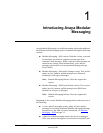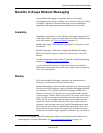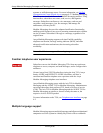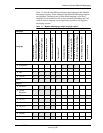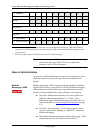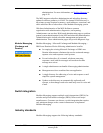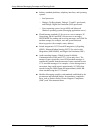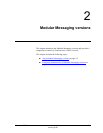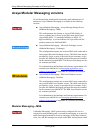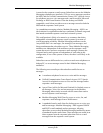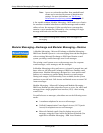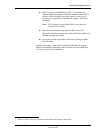
Avaya Modular Messaging Concepts and Planning Guide
1-8 November 2004
Avaya Modular Messaging Concepts and
Planning Guide
! Industry-standard platforms, telephony interfaces, and operating
systems:
— Intel processors
— Dialogic Tip/Ring boards, Dialogic T1 and E1 port boards,
and Dialogic Digital Set Emulation (DSE) port boards
— Linux operating system (Avaya MSS) and Microsoft
Windows operating system (Messaging application server)
! IP and Internet standards: IP for server-to-server transport, IP
Networking, IMAP4 and POP3 client access to messages,
SMTP/MIME for sending and receiving messages, and LDAP for
attribute storage (for example, user and system data) and
directory queries (for example, name, address)
! Switch integrations: H.323-based IP integration, Q.Signaling
(QSIG), Enhanced Inband Analog, RS232 for serial switch
integrations (SMSI/SMDI), and Digital Set Emulation (DSE)
! Audio encoding formats: Global System for Mobile
Communications (GSM) and G.711 (A-law and µ-law). The
amount of space required to store GSM-encoded messages is
considerably smaller than the amount of space required to store
G.711-encoded messages. For example, a voice message that is
one minute long would require approximately 95.2 KB when
encoded using the GSM format and approximately 468.8 KB
when encoded using the G.711 format.
! Modular Messaging complies with standards established by the
government and standards bodies, for mandatory compliance
areas, such as Product Safety, Electro Magnetic Compliance
(EMC), and Telecommunications.




